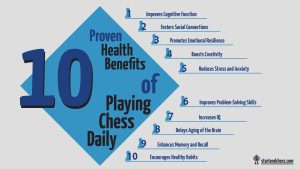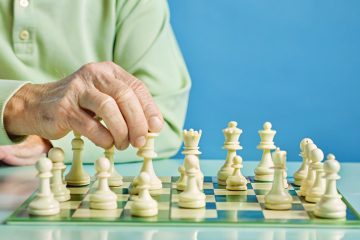10 Proven Health Benefits of Playing Chess Daily
In a world where mental and physical well-being are increasingly prioritized, finding activities that enhance both can be invaluable. Enter chess—a game that has stood the test of time, known for its strategic depth and intellectual rigor. But did you know that the health benefits of chess extend far beyond sharpening your mind? Whether you’re a seasoned player or a curious beginner, playing chess daily offers a wealth of health advantages that can improve your quality of life in surprising ways.
The health benefits of playing chess daily are as diverse as they are compelling. From boosting cognitive function and enhancing memory to reducing stress and promoting emotional resilience, chess is more than just a game—it’s a powerful tool for maintaining and improving overall health. In this article, we will delve into 10 proven health benefits of chess that make this ancient game an essential part of a healthy lifestyle. By understanding these benefits, you’ll discover how incorporating chess into your daily routine can lead to a sharper mind, a more balanced life, and a healthier you.

-
Improves Cognitive Function
Chess is considered an mental gym, and rightly so. For in a game of chess, you need a great amount of concentration, high-level strategic thinking, and problem-solving skills—all helping toward improvement in higher cognitive functions. Playing chess challenges you with an intellectually rigorous mental exercise that stirs different parts of the brain, culminating in increased cognitive abilities over time.
- Critical Thinking and Planning: Essentially, chess requires a player to think analytically and strategically, setting several moves ahead. Such forward thinking is not dispensable while a player is playing the game of chess. This system of thinking is transferred onto real life since one needs to project outcomes of actions and makes your decisions based on those inferences. Playing chess regularly trains your brain to look at situations from different angles, weigh the pros and cons of an action, and make a decision that will have an overall impact.
- Neural Pathways and Brain Plasticity: Attention and strategic thinking are linked to chess, even down to their quantifiable extent. Such is the process of neuroplasticity: the reorganization and allowance for adjustments within the brain for more efficient performance. Practice in playing chess regularly will help increase your brain plasticity, ease of learning new skills, adjusting to changes, and solving problems efficiently.
- Left and Right Brain Coordination: Probably the most peculiar single aspect of playing chess is the involvement it requires of both hemispheres of the brain. The left hemisphere—responsible for logical thinking and analysis—is working while one is calculating moves and risks that may arise. On the other hand, the right hemisphere—in charge of creativity and pattern recognition—is working on developing new strategies and trying to conceive what tactics your opponent might be working on. This double engagement strengthens the coordination between the two sides of the brain, promoting improved overall cognitive function.
-
Enhances Memory and Recall
Probably the most exciting advantage of playing chess daily is in memory and recall. Chess is a game that calls for strategies, thinking ahead, remembering sequences of moves, anticipation of reactions from one’s opponent, and adjusting one’s plans accordingly. It is a mental activity that increases one’s short-term and long-term memory at very impressive rates; hence, good for the development of memory.
- Working Memory Improvement: Chess players continually exercise their working memory, in other words, holding and processing information in the short term. In every game, players must remember the position of the pieces, how they can move against possible opposites that their opponent might use, and be able to predict what will happen if they think two or three moves ahead. All this continuous mental juggling acts to enhance the brain’s ability to deal with and manipulate information, thereby promoting working memory.
- Pattern Recognition: One of the most critical facets of chess is recognizing the patterns on the board. The more experienced players, over time, can identify quite quickly common positions and strategies, and it helps one reach much faster and more accurate decisions while playing. The ability to recognize patterns transfers beyond the chessboard, enhancing the brain’s ability to recognize and recall patterns in everyday situations, thereby improving memory recall overall.
- Long-Term Memory Enhancement: It not only improves working memory but also long-term memory. Quite frequently, great games, strategies, or opening sequences are studied by players who then commit a large bank of information to memory. Regularly practicing, recalling the strategies, and trying to use them in different scenarios strengthens one’s long-term memory to help in retention and retrieval of information over extended periods.
- Delay in Cognitive Decline: The most striking thing about the effects from playing chess is the memory-enhancing capability that age-related cognitive decline is delayed. It has been shown that playing chess and other games that challenge the mind in a similar way could very well prevent memory loss with age and therefore reduce the potential risk of dementia and Alzheimer’s. Since chess keeps the brain active and challenged, the player will retain his memory and cognitive functioning well into his old age.
- Application in Real-Life Scenarios: These memory-enhancing effects of playing chess do not stop at the board. Many players report having their enhanced memory skills carry over into everyday life. From remembering important dates to remembering names and faces, or even learning new skills, the memory boosts gained from chess help to deliver finer performance in personal and professional life.
-
Promotes Emotional Resilience
Emotional resilience might be understood as the person’s ability to adapt and recover from stress, adversity, or challenges. In today’s fast-moving world, developing emotional resilience is most necessary for one’s mind. Chess comprises strategy, patience, and a competitive spirit that acts as a great field of practice in building such a major life skill.
- Learning to Handle Defeat: Probably the most important lesson chess can teach is how one loses. The best of players at this game, with all its strengths, are sure to lose. Every defeat provides the chance to reflect upon the way the game was played and analyze the mistakes made, thereby inculcating the growth mindset that setbacks are not really failures but genuinely real learning lessons. Such a mindset, over time, influences stronger emotional resilience, for the player learns to rise up from among various challenges on and off the board.
- Developing Patience and Persistence: It is a game that requires thought about strategy and long-term planning, thinking several moves ahead, and patiently waiting for the right moment for the execution of plans. All of this patience pays a vital role in developing emotional resilience since it teaches one to be patient, cool-headed, and persistent, even when things become really tough. This focused and cool attitude, within the uncertain setting and challenge of the game, enhances one’s resilience to life stressors.
- Building Confidence and Self-Esteem: The winning of chess competitions, as players get better, gives an accomplishment with confidence. This surge in the area of self-esteem contributes to emotional resiliency—players believe more in their ability to win or overcome. Confidence derived from mastering chess strategies and gaining success on the board can extend into areas outside of chess and into other areas of life to better handle obstacles with increased assurance and determination.
- Encouraging a Balanced Perspective: Chess provides players with a bigger picture, thus getting the players to weigh all possible outcomes from an action. This balanced perspective provides a base for developing emotional resilience in the player by perhaps asking him to weigh his options and not be overthrown by transient, turbulent emotions or setbacks. By developing this mental attitude, chess helps take on life’s challenges with greater equanimity and poise.
- Enhancing Emotional Intelligence: Chess improves emotional intelligence, which means the identification and control over one’s emotions and that of those around them. Grasping the emotional nature of a game, such as its psychological effects due to a well-timed move or the state of the mind of the opponent, might improve decision-making and relational skills. Through this heightened state of emotional awareness, players acquire resilience to overcome any difficult social interaction or stressful situation.

-
Boosts Creativity
While people usually look at chess as a strictly logical and strategic game, in reality, it has had a strong effect on improving one’s creativity. It makes one think out of the box, formulate new ideas, and derive unexpected solutions to rather complex problems. Therefore, playing chess regularly will definitely help develop creative thinking skills to a large extent, and thus, this centuries-old game is very helpful for building creativity in all walks of life.
- Creative Problem-Solving: At the very least, chess represents a problem-solving exercise. Every move must take into account the current position, ascertaining or foreseeing threats and developing a plan that answers immediate concerns yet sets a stage for later success. Much of this process is creative thinking, as many of the most effective strategies are not necessarily the most obvious. Players learn how to look at problems from different angles, try out unconventional moves, and adapt strategies while the game is in play. This creative problem-solving skill becomes very valuable in real-life situations where such innovative thinking would otherwise create breakthrough solutions and bring new perspectives into a situation.
- Imaginative Play and Strategy Development: The positions and the situations in chess are unlimited, and therefore this has a wide scope for imaginative play. A player must constantly place himself in his opponent’s shoes, imagining what he is going to do in the next move and what will happen with different strategies. Of course, this requires a lot of imagination, as players simulate through their minds several options and test new ideas. The development and refinement process of strategy enhances creativity and makes the gameplay more innovative and effective.
- Engagement of the Right Brain: While chess no doubt challenges the logical, analytical left side of the brain, it also puts the creative right hemisphere to work. Pattern recognition, intuition, and holistic thinking are functions of the right brain, which includes variables forming the core of creativity. A chess player trains his right brain in the processes of creation through pattern identification on the board, flows of a game, and intuitive strategies in the making. It makes one engaged with the balancing of the brain, which also improves the totality of cognitive functions and enhances creative thinking.
- Breaking Conventional Thinking: Chess so often imparts the task of getting out of conventional thinking and coming to new ones. It’s very surprising, and the best are those who have the ability to adapt or even create new strategies in the face of altering circumstances. Taking risks and trying something that is often quite unusual are elements of creativity. It is through playing the game of chess that players apply thinking out of the box and open up to handling unconventional ideas.
- Stimulating Divergent Thinking: Divergent thinking, a characteristic hallmark of creative thought, is the ability to generate many solutions to a single problem. Chess fosters divergent thinking by providing players with intricate problems that have several approaches. In chess, very rarely will a player find a “right” move; rather, he or she is called upon to assess the options available and pick the one that best serves his or her general strategy. In such a process, he views various possibilities and settles on the most creative solution. In return, that enhances the skills of divergent thinking, which are critical factors for innovation and creativity in any domain.
- Inspiration Through Artistry: Often, chess has been described as an art form, and almost, for that reason, it has its own unique aesthetic and beauty. An elegant strategy, a satisfactory on-the-mark move, and creative expression of personality style add to the artistic quality attached to the game. For many players, chess is a source of inspiration; it forces them to see the world with more creativity. Such respect to the beauty of chess can lead to creativity of any aspect, from visual art to writing to music.
-
Reduces Stress and Anxiety
The effective ways chess manages stress and anxiety have become an absolute must in the present age. Whereas various approaches may lead to inner peace, playing chess is among the most fascinating and successful ones. This eternal game will not only hone minds and sharpen thoughts, but it will also provide people with an impressive tool in the reduction of stress and alleviation of anxiety. Here’s how chess contributes to inner peace and a more balanced mental state.
- Mindful Focus and Concentration: Chess requires full concentration and draws one’s mind away from worries and anxiety. If you are deep into the game, your mind is completely occupied with analyzing the board in an effort to try and guess your opponent’s next moves and plan your strategy. That is a very high level of engagement that creates full presence. Engaging your mind with the intricacies of the game allows it to take a breather from stressors, hence calming it with clarity.
- Stress Relief Through Engagement: Engaging in a mentally challenging activity, like playing chess, offers the mind some form of distraction, which works magic in arresting stress levels. Problems posed by the game take one deep into thought, engage one in solving problems, and make demands for strategic decisions to be made—thus keeping your mind off ordinary worries. Therefore, a mental engagement such as this will relieve one of stress, as it draws the mind away from bad thoughts to an area characterized by intricacies of the game, easing one’s feelings of anxiety.
- Encouraging a Calm and Strategic Mindset: Chess teaches a lot of things that facilitate a calmer mind: patience, careful planning, and measured response. The game requires one to think several moves ahead, anticipating what the opponent shall do in their strategy, and sometimes even changing accordingly. That kind of emphasis on strategic thinking lays great emphasis on a calm and systematic approach toward problems and has been a lot of help when dealing with real-life stressful situations. Knowing how to keep calm and focused under pressure on the board could give you that same sort of calm focus in other areas.
- A Safe Outlet for Competitive Energy: For the more competitive among us, chess serves to contain a good outlet for our competitive energies. It allows you to discharge your drive to succeed without it being too pressurizing—an environment found in most sports or other competitive activities. This controlled competition can serve to help lessen levels of anxiety by providing a structured and, hence, predictable environment where one can test their skills and strategies. Beating someone at chess enhances your mood and gives you a feeling of achievement, while losing gives one an opportunity for growth and reflection, both of which can eventually lower levels of stress.
- Social Interaction and Support: Most of the time, playing chess in a real-life situation or online requires a level of social interaction that helps in cutting down on stress and anxiety. To some extent, getting to interact with others through a common interest creates bonding and a sense of belonging, something very fundamental to emotional well-being. Friendly games with others offer you intellectual stimulation and some degree of emotional support by getting you to know people who share the same interest in the game. Such social contacts can contribute to reducing feelings of loneliness and isolation, which are very common contributors to stress and anxiety.
- Endorphin Release and Mood Enhancement: Participation in activities for pleasure, such as playing chess, will stimulate an increase in endorphins, which are natural “feel-good” chemicals in the body. Endorphins reduce sensations of pain and help nullify impending moods, causing an individual to generally feel good. The feel-good nature, due to an amazing move made or a well-fought game won, accentuates on your satisfaction which gives a positive feedback loop, relaxing one from stress and spinning one’s emotional state.
- Providing a Sense of Control: The most stressful elements of life almost always have to do with not having control. In chess, on the other hand, you are given a specific game environment in which you are the captain of your decisions and can actively will your way to your outcome in the game. The ability to be in control of your emotions and your strategy within the game is rewarding in itself and can be most empowering for all those who suffer from anxiety. Knowing you have an effect on the outcome of the game directly can give one confidence in his ability to face difficulties in real life, hence reducing anxiety.
-
Improves Problem-Solving Skills
Chess has long been known for its potential to develop problem-solving skills; it’s, therefore, one of the best tools to train your mind and make quality decisions. Being a strategy-based game of foresight, chess means constant situation analysis, estimation of possible outcomes, and search for a working solution—all of which give superior problem-solving abilities both on and off the board.
- Strategic Thinking and Planning: The game of chess, at its very core, is about thinking strategically. Every move across the chessboard brings one closer to something bigger: to center control, piece safety, or checkmate. Planning several moves ahead will not suffice without considering a line of strategy one will use and predict opponents’ responses. This kind of strategic planning at one’s level enhances the ability to think both critically and logically, two of the very fundamental tools for the solution of any problem under any context.
- Evaluating Multiple Scenarios: Chess requires its players to consider a variety of different scenarios at any given time. With every potential move, there exists an identity crisis of possibilities associated with it, all carrying risks and rewards. Players weigh these options against each other, considering consequences for each action to settle on the road that best puts one in a position to win. Through the processing and study of these scenarios, the mind is developed for quick and exact analysis of complicated situations—a function that can translate very easily into problem-solving.
- Adaptability and Flexibility: The best you can plan may be destroyed in a move by your chess opponent, and you might be forced to again readjust, rethink, and reconfigure your strategy. In this respect, therefore, you require the power of adaptability, the pivot of good, solid problem-solving. In a way somewhat parallel to life, a game of chess usually has sudden problems wherein the mind is called to be flexible and make quick, sharp turns to survive. Chess is going to teach one to learn how to keep his or her mind open to new possibilities, to change plans when it is necessary, and to look for a way out while under pressure—something that is very apt to guide an individual through life’s uncertainties.
- Recognizing Patterns and Trends: Good chess players recognize the patterns and trends of their strategies and those of their opponents. Improving one’s ability to recognize recurring themes, and hence being better at predicting future development, is important in solving any problem. By recognizing the patterns, players can foresee problems before they actually occur and act to forestall them. This is such a useful skill in life, where the ability to plan ahead, project, and prevent little problems from growing into big ones is most important.
- Logical Reasoning and Deductive Thinking: Chess demands the rigorous exercise of logical reasoning and deductive thinking. The requirement here is to review the board, notice threats, and choose actions pursuant to that information. Such a logical approach to solving problems helps chess players acquire the habit of systematic and gradual thinking to ensure decisions made are based on evidence and rational analysis rather than impulse or emotion. The habit of reasoning logically, developed from playing chess, can help a person in solving many problems–from personal problems to professional ones.
- Perseverance and Persistence: Many times, the solution is not obvious and requires persistence. Therefore, chess teaches patience: in most games, there are protracted fights for which victory is only assured to the focused and determined player. Keeping on pushing with the ability to solve a problem when the outcome is not certain is part of problem-solving. Through chess, one learns the very important aspects: patience, how to look at things from different perspectives, and working tirelessly toward a solution, even though the path might be hard.
- Decision-Making Under Pressure: Chess is a game of constant decision-making and, quite often, under great pressure. Whether the clock is ticking in a timed match or one is in a tough position and needs to think fast, players continually have to make decisions given the constraints of time and information. The process of making high-stake decisions under pressure is itself a very powerful route to building problem-solving skills. This skill is of much value in real life, where every moment requires a person to act quickly and decisively. To be able to remain calm, focused, and decisive under stressful conditions is therefore very important.

-
Increases IQ
It is considered to be one of the most exciting reasons why one should play chess regularly: it may help increase one’s IQ, or Intelligence Quotient. Chess offers a wide array of complex mental activities going on inside the brain, including problem-solving, critical thinking, and memorization. All these activities combined help foster the development of the brain and increase intellectual growth in general. Spending years playing chess will gain points of IQ, making this game an intellect enhancer and not just a hobby.
- Enhances Analytical and Logical Thinking: Chess, by its very nature, is a game of reasoning and analysis. Any move must take into account with great care the position of a player on the board at any one time, what that board might look like in many future positions, and the overall strategies that will be most effective at any moment in both short- and long-term thinking. The constant need for analytical thought in this manner strengthens the brain’s abilities to process information, recognize patterns, and reach logical decisions. These skills are directly related to increasing IQ because they promote the development of the brain in cases of solving difficult problems and critical thinking.
- Boosts Spatial Intelligence: Spatial intelligence is the ability to envision and manipulate objects in space; it is one of the components of IQ. Chess requires one to envision the board, estimate the movement of various pieces, and calculate, in one’s mind, the repercussions of each move. Such an activity associated with spatial reasoning enhances this dimension of intelligence and hence offers better performance on tasks that call for spatial awareness, as in mathematics, engineering, and architecture.
- Develops Memory and Learning Ability: Chess requires memorization of many strategies, various opening moves, and, of course, possible combinations. This exercises both short-term and long-term memory. Making conclusions from every game, analyzing mistakes, and applying new strategies in further games increases the learning capacity of the brain, hence further intellectual development.
- Encourages Creative and Divergent Thinking: While chess is considered a logical game, it also requires an infusion of creativity. It involves creating new ideas, planning many moves ahead, and sometimes even using unconventional methods to outmaneuver opponents. While doing this, a blend of creative and logical thinking paves the way for divergent thinking—that which builds the ability to come up with many solutions to a single problem. Divergent thinking is an important aspect of IQ in that it quantifies an individual’s brain efficiencies in attending to different positions on the same problem and thinking creatively.
- Strengthens Problem-Solving Skills: Essentially, chess is a series of problems with its own unique solution. The game requires a player to solve such problems with a time limit and inadequate information. This daily practice develops a person’s problem-solving skills, hence increasing his IQ. Evaluating a situation quickly, thinking of as many answers as possible, and then implementing the best solution is a hallmark of extreme intelligence, and the quickest way to gain this element is by playing chess.
- Stimulates Both Hemispheres of the Brain: Chess exercises both the left and right hemispheres of the brain, therefore balancing the ‘logical analysis’ with ‘creative thinking’. The left hemisphere is in charge of logical reasoning and is activated when moves are considered. On the other hand, the right hemisphere deals with creativity and intuition; therefore, it is activated when developing a completely new strategy or trying to guess the moves of an opponent. Such activity of the balanced brain improves general cognitive abilities and adds to a greater IQ, as it nourishes an overall, all-round intellectual capacity.
- Improves Cognitive Flexibility: It means a frequent shift from tasks or thoughts to something else and adapting to new circumstances. Play in chess requires continuous adaptation of strategy with the move of the opponent and the unfolding condition of the game. This adaptability enhances cognitive flexibility, one of the main subjects of intelligence. Chess players regularly have been shown to think sufficiently quickly and develop adaptability to changing circumstances, but they also find novel solutions to challenging and unexpected challenges—all leading to a higher IQ.
-
Delays Aging of the Brain
Cognitive health becomes more vital with every added year. Of all the ways to maintain the brain in top functional states and to stave off former effects of deteriorating cognitive ability, mentally stimulating activities are very intense. Chess is one valuable activity. Regular gaming in chess delays aging processes in your brain, harnesses mental acuity, memory, and decreases the risk of age-related disorders in cognitive capability.
- Neuroplasticity and Cognitive Reserve: Neuroplasticity refers to how the brain has the ability to adapt, reorganize, and form new neural connections throughout an individual’s life. Engaging in cognitively demanding activities like chess promotes neuroplasticity, which creates flexibility and adaptability for additional information. In effect, through constant practice of the brain, chess offers the creation of cognitive reserve—the brain’s ability to sustain functioning when undergoing natural aging or with some damage. A greater cognitive reserve would therefore just delay the onset of symptoms associated with declining abilities, such as memory loss and reduced problem-solving.
- Prevention of Dementia and Alzheimer’s Disease: Playing chess frequently has been related to the reduced risks of developing dementia and Alzheimer’s. It requires persistent mental efforts to be made, therefore strengthening neural pathways and increasing general brain functionality. This conclusion was derived from several studies that have reported that those people who are involved in mentally stimulating activities have lower risks for the development of dementia. The continuous challenge that chess provides keeps the mind active; this is important in maintaining cognitive health with aging.
- Memory Enhancement and Retention: Chess is a very memory-demanding game because players need to memorize many complex strategies, recognize patterns, and evaluate positions to plan future moves. This constant mental exercise improves the functioning of both short- and long-term memory. This is particularly important in elderly people. Continual activation of memory and recall processes in chess playing serves to preserve these cognitive functions, thereby delaying memory losses associated with age and maintaining a sharp mind for many years.
- Stimulation of Both Hemispheres of the Brain: Chess requires both the left and right hemispheres of the brain, thus exercising the whole cognitive range. The left hemisphere is exercised due to the calculation of moves and strategies, since it is in charge of logics and analytical thinking. On the other hand, the right hemisphere manages creativity and spatial awareness, so this hemisphere is activated when a player imagines the board, predicts the actions of his or her rival, and creates new strategies. This balanced stimulation helps to keep the whole brain active and healthy, hence slowing down the aging process by retaining cognitive function.
- Mental Agility and Quick Thinking: Our ability to process information generally slows as we get older. Chess counteracts this because it requires fast thinking and quick responses to game pressures. Whether playing in a time-limited match or just against an opponent who happens to be tough, rapid decision-making in chess keeps the brain agile and alert. This regular mental exercise will help one to remain sharp and quick with processing and therefore remain sharp with his or her thinking throughout the years of old age.
- Social Interaction and Emotional Well-being: Of the major variables for keeping cognitive health, social interaction is one, and chess does present a great opportunity for one to keep up with it. One can engage in the game socially by playing it with friends, participating in chess clubs, or even by having online matches. It will help one keep off feelings of loneliness and isolation, which are reported to have a very close link with cognitive decline. Moreover, emotional fulfillment with activities like the excitement of playing a good game or the social aspect involving chess keeps the mind healthy when aging.
- Reduction of Stress and Promotion of Mental Relaxation: Chronic stress is a huge promoter of the aging process, particularly in regard to cognitive decline. Chess allows the mind to unwind from the stresses and, thus, might protect the brain from the negative impact of stress. Concentration in playing chess lets the mind forget about other stresses that may be present throughout the day, hence offering a mindful activity for reducing stress. This, in turn, helps relax the mind and preserves the healthy and young brain by preventing its early aging.
-
Fosters Social Connections
One can think of chess as a lonely game, whereas in reality, the game proves to be an excellent tool for social networking. Whether played online or over the board, chess can bring people together across generations, cultures, and all kinds of backgrounds. Besides providing enjoyment and excitement, such socialization brings enormous mental and emotional benefits to your health. So, regular play does a lot to greatly enhance your social life, forge long-term friendships, or even provide a sense of community and belonging.
- Building Friendships Across Ages and Cultures: It is a universal language that does not make any distinctions based on age, culture, or region. The rules are so simple; the strategy is so complex—access is provided to everybody, from small children to elderly people. Chess clubs, tournaments, and online platforms bring together different kinds of people, enabling friendships that otherwise might never have been made. These, therefore, may prove especially instrumental to elderly people or those who otherwise feel disconnected, acting as a means to socialize with others over some sort of shared passion.
- Creating a Sense of Community: It creates a very strong feeling of belonging when one participates in chess clubs, local tournaments, or an online chess community. A group sharing an interest provides support from people with commonality of purpose—encouragement and companionship. This sense of community can therefore be quite useful to people who otherwise would not have much opportunity for socialization. It provides an organized and friendly setting for interacting with others. Generally speaking, the chess playing community includes beginners and expert players alike who are very open, supportive, and willing to help members of their group improve.
- Enhancing Communication Skills: Chess is likely to bring out the communicator in a person—not only in playful strategies but also in tactics that are suggested, and in mere chit-chat with the opponent during a game. They guard against clear and effective bi-directional exchange of ideas through these interactions. Further, such discussions related to the analysis of games or learning techniques can lead to deep exchanges and close relationships among players. Chess is truly a collaborator: the times when team formats are used, or studying is done with people, deepen these instances.
- Reducing Loneliness and Social Isolation: It is a major concern in today’s society, most of all in older adults: loneliness and social isolation. Chess offers this meaningful way of avoiding this feeling by providing regular social interaction. Playing chess either face-to-face or online gives people something to look forward to and hence a reason to connect with others. The structure of the game is a comfortable setting for interaction; players can focus on the game while simultaneously being with others. Dual focus like this lessens the pressure of social interaction.
- Providing Opportunities for Intergenerational Interaction: Chess is a universal language, age is irrelevant, and so it’s actually a very good instrument for intergenerational relationships. This will help grandparents to share with their grandchildren the experience of playing chess while spending quality time together. These interactions prove pleasurable and mutually very rewarding—young people gain wisdom and perspective, older adults get the pleasure of teaching and mentoring. This sharing of ideas and experiences tends to strengthen family bonds and foster mutual respect and understanding between generations.
- Connecting with a Global Community: The increasing popularity of online chess has certainly opened up new doors and opportunities for connecting with players worldwide. Online chess transcends location limitations, opening the opportunity to play against, learn from, and understand people belonging to diverse cultures and backgrounds. This global connection will further broaden your views, expose you to different styles of play, and inculcate in you a sense of global citizenship. Thereby, the online friendships and connections that one is going to gain in a web community could be as real as those made in person, with the added advantage of broadening cultural exposure.
- Encouraging Collaboration and Teamwork: While chess is a solo game, there is much team togetherness available within that community, at a mature, professional, or amateur level. It is through team chess events, cooperative study sessions, or collaborative game analysis that one can work with, share insights, and support the learning of one another. Such experiences help in developing teamwork and mutual respect whereby both the members learn to value each other’s inputs, strengths, and contributions. Besides, those teamwork skills that one can acquire through chess can be easily transferred to other areas, thus making working in a team an individual matter.

-
Encourages Healthy Habits
Playing chess regularly may not only sharpen the mind but further instigate certain habits that are healthy and promote well-being. The discipline needed to excel in chess has often extended into other aspects of life, promoting habits that benefit both the body and mind. This could be in creating routine, a better diet, or increased mental health—chess can be a robust motivator to start living healthily or continue to do so.
- Promotes Discipline and Routine: Success in chess means continuous practice and dedication; such commitment instills discipline. Most chess players set up a regular regime for studying the game, practicing the strategies, or just going over their matches. This disciplined approach in chess extends into everyday life, thereby helping to develop other healthy habits such as regular exercise, good eating, and time management. The habit of practicing chess is therefore a stepping stone toward a more systematic, organized, health-oriented way of life.
- Enhances Focus and Mindfulness: Chess is a mind game that requires highly concentrated and focused attention from its players. Each match calls for presence of mind and being in the moment. This type of focus on the present moment is similar to the practices of mindfulness, which have been linked to stress reduction and improved mental health. Concentration is enhanced by regularly playing chess, which enables the mind to focus in other aspects of life, such as at work or in studies, or even on personal matters. It increases awareness, which may manifest in various ways, including being more mindful of what one eats, adhering better to exercise, and being more aware of one’s health status.
- Encourages Mental and Emotional Balance: Chess is an emotionally demanding game in which a player has to keep up his emotional state, particularly under pressure. Thus, developing calmness, focus, and composure throughout the match is very likely to cultivate greater emotional toughness and mental poise in one’s day-to-day life. This emotional stability tends to prompt emotionally healthier ways of managing stress through relaxation, exercise, or social support. Chess cultivates a balanced and resilient mindset in a person, leading toward the making of healthier choices in support of mental and emotional wellbeing.
- Inspires a Healthy Lifestyle: The sharpness of mind that one gains through chess often serves as an inspiration to adopt other healthy habits which sustain cognitive functioning. More often than not, people who are passionate about chess understand how vital a good diet, regular exercise, and a full night of sleep are in peak performance. Such awareness can give way to better life habits such as healthy and brain-enhancing food intake and a physically active lifestyle that is supportive of sharp mental capabilities, complemented by good sleep for clearer thinking. Interest in chess can become a motivator in making these most desirable life changes.
- Promotes Social and Community Engagement: Playing chess in clubs or participating in tournaments or even online, helps a person socialize. Social engagement is a part of healthy living. It improves emotional wellbeing by reducing feelings of isolation and depression. Through regular chess activities, it will motivate them to be socially active, seek new friendships, and become involved in their communities; hence, a better life that is also healthier.
- Encourages Lifelong Learning and Personal Growth: Chess is a game of continuous learning, with players constantly updating their skills and strategies in the bid to improve. These commitments grow personal growth and intellectual development, which may further influence interest in lifelong learning through education, hobbies, and personal development. The constant challenges to improve will help develop good habits such as regular reading, developing new interests, and active mental functioning throughout life. Such dedication towards learning and self-improvement is an important attribute of a healthy and vibrant lifestyle.
- Reduces Risk of Unhealthy Behaviors: It allows time and focus toward chess to minimize the likelihood of engaging in less healthy behaviors. As an example, chess provides a mentally invigorating alternative to common passive activities, such as excessive screen time or senseless eating. It helps to create a healthier balance between mental engagement and relaxation time because chess fills leisure time with a challenging yet rewarding pursuit, reducing the opportunity for habits that have the potential to negatively affect both physical and mental health.
- Inspires Healthy Competition and Motivation: Although chess is competitive by nature, it contains elements that help to foster healthy competitiveness. The players compete with courtesy, fairness, and sportsmanship, attributes that can easily be applied to any other aspect of life. Be it at work or in sports, or better still, in achieving goals one may set, this healthy competitive spirit shall help keep one going to the very best—in fitness, career aspirations, or personal challenges. This struggle for chess improvement can foster similar goal-oriented focus and struggle in other areas of life.
Conclusion
Incorporating chess into your daily routine is more than just a pastime—it’s a powerful investment in your overall health and well-being. Each move on the board is a step toward a sharper mind, a calmer spirit, and a more resilient self. From boosting your memory and problem-solving skills to fostering social connections and reducing stress, the benefits of playing chess daily are both profound and far-reaching. Whether you’re navigating life’s challenges or simply looking to enhance your mental agility, chess offers a unique blend of intellectual stimulation and emotional support.
So, why not embrace this ancient game as a daily ritual? As you engage with each strategic move, you’re not just playing a game—you’re cultivating a healthier, more balanced life. Let chess be your daily mental workout, your creative outlet, and your tool for lifelong learning. The benefits are clear, and the rewards extend well beyond the chessboard.



0 Comments